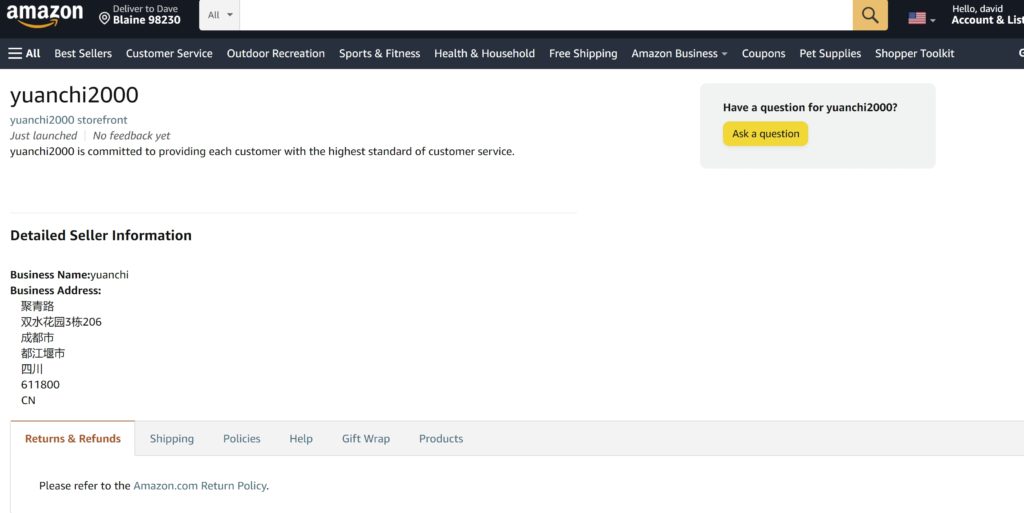Chinese Seller Replaces “The Hobbit” Listing Page with Prostate Massager

On Tuesday, the best selling book “The Hobbit” had its entire Amazon product detail page overtaken by hijackers selling a prostate vibrator.

The entire Product Detail Page for The Hobbit was replaced with details for a prostate massager adult toy including the title, bullet points, and pictures. After several hours, and as of this writing, the product detail page for The Hobbit book still shows details for the prostate massager.
The seller had also hijacked many other book titles including The Host, The Help, The Illiad, The Ickabog, and The Honeybee, and replaced them with adult toys.

Nefarious sellers hijack best-selling products like this in attempt to take advantage of the review history of a product, in this case 27,250 ratings with an average of 5-stars, along with taking advantage of the Best Seller Rank (BSR) of the hijacked product, to have their product appear higher on search results pages and capitalize on a surge of short term sales until Amazon corrects the hijacked page. Often customers who purchase the item being advertised (in this case an adult toy) will be sent a very poor quality product or even an empty box.
Amazon Recently Purchased the Rights for The Lord of the Rings for Prime Video
The timing of the hijacking of many of J.R.R. Tolkien's books is slightly embarrassing for Amazon as they had recently announced on August 2 that its “The Lord of The Rings” series (for which they paid $250 million for the rights to) would premiere worldwide in September 2022.
“Detail Page” Hijacking is a Major Problem Along with Other Black Hat Tactics
Product detail page hijacking has been an issue for Amazon and Amazon sellers for many years now.
Several years ago during the height of the Christmas holiday season, the product listing page for the Playstation 4 was hijacked and replaced by a yoga product.
Along with product detail page hacking, Amazon struggles with a number of other so-called black hat tactics, the most prolific being fake reviews. Several months ago Amazon suspended thousands of sellers, most based in China, for review manipulation after a massive leak of the names of sellers buying fake reviews was released.
How Product Hijacking Works
Sellers are able to replace the entire product description of a best selling product like The Hobbit in numerous ways. All of the ways, however, relate back to the fact that Amazon works on a contributor based model, much like Wikipedia. Any seller can sell nearly any product (except for those products that are ‘gated') and every seller can make ‘contributions' to a product. In this case, the seller's contributions equated to replacing J. R. R. Tolkien's best selling book's details with that of an adult toy.
Whether or not a seller's contributions take effect come down to a number of factors such as whether the contributor is in fact Amazon themselves, whether the contributor who is a seller has Brand Registry for a product, or whether the seller making the contribution is a third party seller (3P Seller) or Vendor Central client (1P Seller). In the past, many listing hijackings occur through a seller having access to a Vendor Central account that allows that seller to aggressively push contributions to almost any product in Amazon's catalog.
In many cases, it can take Amazon hours or even days to fix the problem.
Many Black Hat Tactics Originate in China
Many of the Black Hat tactics used by sellers originate with China based sellers. In this case, the seller, selling under the name yuanchi, is based in Sichuan province in China (聚青路双水花园3栋206成都市都江堰市四川611800CN).

The proliferation of black hat tactics has a number of reasons, but largely comes down to two factors. First, China based sellers account for well over 60% of Amazon third party sellers. And second, these sellers are able to open multiple Amazon seller accounts relatively more easily than other sellers, allowing them to take more risks such as this.
Amazon Sellers Face Sabotage on a Routine Basis
The hijacking of a massively popular product like The Hobbit highlights one of the issues faced by Amazon sellers on a regular basis – competitor sabotage. Many sellers have been victimized by ‘listing-hijacking' such as this. Even in a high-profile case like this one, Amazon has been unable to fix the problem after several hours. For a smaller seller, competitor sabotage can often take days or longer to fix and often spell big financial duress. By bringing attention to outright abuse and fraud of the Amazon selling ecosystem, one can hope that Amazon directs more resources to eliminating problems and abuse such as this and rectifying them more quickly when they occur.




We had this several times recently, where a Chinese seller changed various attributes on an inactive listing of ours (due to
Awaiting stock) including the brand name. Then they added it into their own variation.
We reported as listing violation and then Amazon deactivated the listing and we are now in an endless loop of submitting plan of actions to try to have it reinstated. Is there a proven method(s) to recover these listings from hijackers in hours rather than what is now several weeks?
Sorry to hear :( The best thing you can try is tagging #AmazonHelp on twitter. Otherwise, going in this never ending cycle unfortunately seems to be routine experience.